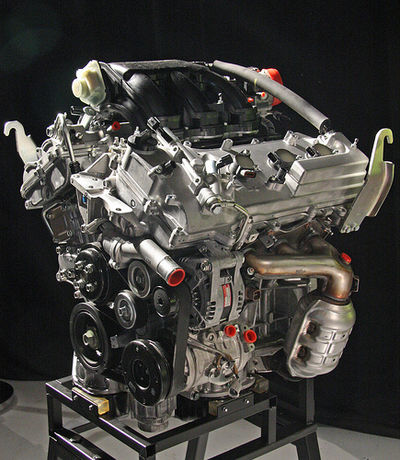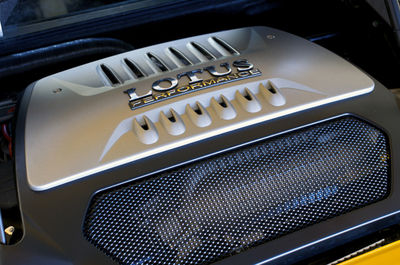Difference between revisions of "Toyota 2GR-FE engine"
m |
m (Image framing) |
||
| Line 7: | Line 7: | ||
It features dual VVTi valve timing which allows for variable valve timing, but not variable lift as per the Elise 111R's 2ZZ-GE engine. | It features dual VVTi valve timing which allows for variable valve timing, but not variable lift as per the Elise 111R's 2ZZ-GE engine. | ||
| − | [[image:2gr-fe.jpg]] | + | [[image:2gr-fe.jpg|thumb|center|400px|The Toyota 2GR-FE]] |
=Basic stats= | =Basic stats= | ||
| Line 56: | Line 56: | ||
This adds an Eaton Roots-type Twin-Vortices supercharger which boosts power to 345hp (350PS/257.5KW) at 7000 rpm and torque to 295lb/ft (400Nm) at 4500 rpm, up from 323bhp in the TRD Aurion - although torque is slightly lower than in the Toyota which peaks at 300lb/ft. | This adds an Eaton Roots-type Twin-Vortices supercharger which boosts power to 345hp (350PS/257.5KW) at 7000 rpm and torque to 295lb/ft (400Nm) at 4500 rpm, up from 323bhp in the TRD Aurion - although torque is slightly lower than in the Toyota which peaks at 300lb/ft. | ||
| − | [[image:Evora S Engine.jpg]] | + | [[image:Evora S Engine.jpg|thumb|center|400px|The 2GR-FZE as fitted to the Evora S. (c) Lotus Cars]] |
=Motorsport= | =Motorsport= | ||
Revision as of 11:14, 20 May 2011
Introduction
The Toyota 2GR-FE engine is currently utilised across the whole range of Evora production cars.
A member of the Toyota GR family of V6 engines, the 2GR-FE is the largest engine in the range designed for transverse engine installations.
It features dual VVTi valve timing which allows for variable valve timing, but not variable lift as per the Elise 111R's 2ZZ-GE engine.
Basic stats
These are the basic stats for the engine when used by Toyota. Further information can be found on the Wikipedia GR page.1
| Engine fuel | Petrol |
| Configuration | V6, transverse installation |
| Capacity | 3456 cc |
| Bore | 94 mm |
| Stroke | 83 mm |
| V Angle | 60 degrees |
| Valves | 32 (4 per cylinder) |
| Head Construction | Aluminium |
| Block Construction | Die-cast aluminium |
| Power | 266bhp (198kW) - 275bhp (205kW) - Varies depending on installation |
| Torque | 245 lb/ft (332Nm) - 257 lb/ft (348Nm) - Varies depending on installation |
| Engine fuel | Petrol |
| Weight | 163 kg (including fluids) |
Evora
While the base model Evora uses the Toyota 2GR-FE seemingly without modification from its Toyota installations Lotus developed their own T6e engine management system.
This allows the rev limit to be increased to 7000 rpm when the car is running in Sports Mode (except when combined with the IPS automatic gearbox, due to gearbox limitations)2.
Fitted in the Evora the 2GR-FE produces 276hp (280PS/206KW) at 6400 rpm, and 258lb/ft (350Nm) at 4600 rpm.
Evora S
For the Evora S, Lotus utilise the 2GR-FZE varient of the 2GR-FE, first seen in the TRD Aurion.3.
This adds an Eaton Roots-type Twin-Vortices supercharger which boosts power to 345hp (350PS/257.5KW) at 7000 rpm and torque to 295lb/ft (400Nm) at 4500 rpm, up from 323bhp in the TRD Aurion - although torque is slightly lower than in the Toyota which peaks at 300lb/ft.
Motorsport
For the various Evora race project Lotus worked have with Cosworth to develop high power, naturally aspirated, variants of the 2GR-FE capable of competing in various motorsport catagories.
To do this the engine was enlarged to 4-litres and fitted with a dry sump oil system to ensure reliable operation even under the high sustained G-forces experienced on the race track.4 Power varies from around 350bhp for the Evora GT4 up to 470bhp for the Evora GTE which is set to compete under GT2 regulations.

